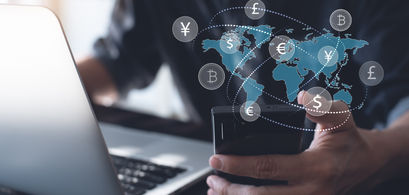Over 800 million people worldwide receive money from friends and loved ones to pay for essentials, such as utilities, education and food. Global remittances are a lifeline to the people who receive them, but they can also be vital to the economies of developing nations. Until recently, person-to-person money movement across borders was the norm, despite the fact that the process can be fragmented, slow and inefficient. At MoneyTransfers.com we understand the desire to send money quickly and efficiently, and this has seen consumers seeking alternative methods for their transfers. According to a survey, 2023 is the first year that digital remittances have overtaken offline remittances as the preferred way to send money abroad.
In 2019, 90% of all remittances still left the sender as cash and reached the recipient as cash, principally because a significant proportion of the world is still “unbanked”. This all changed when the Covid-19 pandemic hit, and during 2020 40.2% of remittances that were previously made in cash suddenly went digital. This number has been steadily creeping up since, thanks in part to regulators raising transaction limits and easing consumer (KYC) requirements. In addition, many companies slashed or waived the fees on mobile money, creating a competitive market.
In all Visa’s surveyed markets, digital remittances have now overtaken non-digital remittances as the preferred method for transfers. Between 60-70% of surveyed remittance users in North America have used an app-based digital payment to send or receive money internationally and this similar trend is observed in Saudi Arabia (69%) and the United Arab Emirates (65%). In Asia Pacific, digital solutions also continue to be the preferred choice, with Filipino remittance receivers intending to use digital transfers to send money in the future (57%) and also to receive money internationally (36%). Worldwide, the proportion of consumers using digital methods to send money stands at 53%, with the next largest group being those who use a physical bank or branch to send money overseas (34%).
Jonathan Merry, CEO of MoneyTransfers.com believes that one reason consumers are falling out of love with banks is the hyper-inflated fees that banks charge for sending money overseas.
Bank payments are subject to high international transfer fees, and also tend to offer less favourable exchange rates. It’s no wonder that more people are moving towards digital remittances, which are more competitive and offer much better value for moneyJonathan Merry, CEO of MoneyTransfers.com
With digital remittance on the rise, it seems money transfer apps are more popular. This is down to the fact that app-based digital payments are considered the most secure method by a strong proportion of remittance users across countries. In Singapore, three out of five (61%) of surveyed consumers reported using digital-only means for sending money internationally, and more than half (53%) of that group gave ease of use and security as their overriding considerations.
Over half of those who have sent money internationally do so about once per month, or more often in the United Arab Emirates (71%), Saudi Arabia (64%) and the Philippines (48%). Among those who have received money, 80% do so at least a few times per year in Saudi Arabia, followed by the Philippines (77%), and those sending money to Mexico (72%).
The emergence of digital apps has not only resulted in money being sent more often, but has also resulted in greater sums of money being sent overseas. It is projected that in 2023 $750 billion USD will be remitted worldwide – a $152 billion USD increase from when the data began in 2014.
With 1.7 billion people globally unbanked, digital remittances play a vital role in our global economy. Consumers are now able to send money quickly from anywhere in the world, and countries are growing increasingly connected. This can only be a positive thing and we at MoneyTransfers expect to see digital remittances grow ever more popular in the coming years.
Contributors








.svg)


